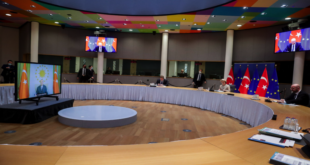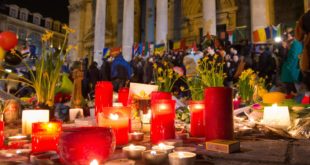Wednesday’s murder of twelve Charlie Hebdo journalists was tragic, brutal and unjustifiable: this is beyond doubt. However, the way in which we understand the attack – and Islamist extremism more generally – desperately requires rethinking.
The current mainstream narrative is both predictable and easy to discern. The front page of Thursday’s L’Equipe – a French daily more used to covering sport – provides its most succinct formulation: “Freedom 0 – 12 Barbarity”. France’s President, Francois Hollande, expanded on the theme, reassuring the nation that “freedom will always be stronger than barbarity. France has always known how to defeat its enemies when it has known how to defend its values”. These values, the BBC had no hesitation in stating, are those of “rational, post-Enlightenment Europe” – to which the monstrous and mindless barbarism of the attackers is presumed to be utterly incomprehensible.
However, this dichotomy between “our” free, democratic and open society and “their” barbaric, violent and primitive mentality is a mirage, an opiate designed to numb our senses and comfort the West’s inflated self-image. The belief that Islamist terrorism derives purely from an evil and alien ideology is intellectually lazy and analytically useless: it substitutes the surface of the conflict for its substance and, in so doing, conceals the actually-existing historical, social and political context from which it – like all conflicts – emerges.
While the form of expression of Islamist terrorism is religious and cultural, its root is political. That is to say: it only exists within current power relations and material conditions, not outside them. We cannot, therefore, understand it without first assessing these circumstances and the role of the most dominant actors in their production – namely, the states and societies of the West.
A Conflict of Violence, not of Values
The point has been made and ignored many times before, yet bears repeating: almost every single perpetrator of Islamist terrorism in Western countries has explicitly cited Western foreign policy as their major motivation. While religious fundamentalism – or any other extremist, militant ideology – certainly provides a language through which to express such opposition, denial of this basic political fact is either disingenuous or deluded.
Two of the clearest of such statements to this effect were given by Boston bomber Dzhokar Tsarnaev and the killer of Lee Rigby, Michael Adebolajo. The former scrawled a message while hiding in a boat. Either side of a declaration of the rising of the Ummah, the opening and closing lines read:
“The US Government is killing our innocent civilians but most of you already know that…Stop killing our innocent people and we will stop.”
Similarly, after Rigby’s murder, Adebolajo told court:
“It was the Iraq war that affected me the most…I saw ‘Operation Shock and Awe’ and it disgusted me. The way it was reported was as if it was praiseworthy, saying ‘look at the might and awe of the West and America’. Every one of those bombs was killing people.”
To reiterate: an explanation is not an excuse and recognising an act as political does not equate to endorsing its actual politics. But both Tsarnaev and Adebolajo unambiguously saw themselves as answering violence with violence and, in an important sense, confronting the societies of the West with the same senseless horror that is regularly visited upon those of the “Third World”. Cherif Kouachi’s 2005 arrest for allegedly planning to travel to Iraq to fight the US-led occupation suggests a similar catalyst for his radicalisation.
In bringing violence beyond the recognised boundaries of the theatre of war, such attackers are following the same logic as the West’s disastrous “War on Terror” itself. If Afghanistan, Iraq and Libya represent highly questionable but nonetheless largely conventional imperialist conflicts, the US-led drone strikes in Pakistan, Somalia and Yemen claim a far more ambitious mandate: the right to strike anyone, anywhere, at any time. None of these places are official warzones; none of the people killed are tried in courts of law; none of the operations are subject to the democratic and constitutional oversight of Congress. The drone strikes – themselves of highly dubious legality – have so far caused around five thousand deaths, with “combatants” simply defined as “any adult male” in the vicinity.
These acts of conventional and unconventional warfare have been accompanied by widespread and horrific torture and the total suspension of the rule of law for terror suspects, no matter how patchy the case against them. Shakar Aamer, like many others, has been in Guantanamo Bay prison for thirteen years. He, like all the rest, has never been tried with any crime, nor even told of what offence he is suspected. Another detainee, recently released after years of un-tried incarceration, is Moazzam Begg. After a court finally found no evidence whatsoever of any terrorist activity, his real “crime” has become clear: attempting to publicise evidence of Western governments’ complicity in torture. The right of “free speech”, it seems, is not as sacrosanct to our culture as Western politicians and media outlets like to claim.
On the contrary, as scholars such as Rahul Rao and Domenico Losurdo have demonstrated, the great liberal values of “rational, post-Enlightenment Europe” have always been employed to legitimise the brute violence of empire. In the twenty-first century, the internationalised, industrialised and institutionalised violence of this politics abroad engenders a predictable blowback in the spectacular yet highly sporadic violence of terror at home. White Europeans may largely – and erroneously – consider the crimes of empire to be a closed chapter in history. But for many Muslims living in Western societies who have friends and families in the countries targeted, imperialist violence is an ongoing reality which cannot be ignored.
Such large-scale, militarised violence finds its domestic equivalent in the societal violence which Muslims experience on an almost daily basis within Western nations themselves. Already, following the massacre at the offices of Charlie Hebdo, mosques have been attacked across Europe. The Daily Mail employs an entirely mainstream vocabulary when it describes this violence as “revenge” and “retaliation”. A Telegraph headline likewise states that the Paris shootings “led to” the attacks on mosques. These are dangerous and disingenuous euphemisms: throwing grenades at Islamic places of worship which have no connection to the gunmen other than the coincidence of sharing a faith is neither “revenge” nor “retaliation”, nor is it “caused” by the attack on Charlie Hebdo. It is racist and it is caused by racism. And it is in itself, by any objective definition, an act of terrorism undeserving of any other name.
The issue of racial prejudice brings us to the now infamous cartoons and what they represent. The right of Charlie Hebdo to publish such images should be defended; so should the right to criticise them as banal rather than brave, racist rather than righteous. Satire is a powerful means of challenging authority, but when it is disproportionately directed against a marginalised and already demonised minority, it becomes just another tool for maintaining racial hierarchies. This, of course, does not provide any justification for the attacks; but the fact that a near-bankrupt magazine decided that the best way to increase profits was to publish Islamophobic cartoons – and Islamophobic they were, often without any obvious “satirical” element whatsoever – indicates the level of prejudice against Muslims in French society at large.
It is only through such racism that the routine denial of basic democratic rights to Muslims can appear acceptable or pass unnoticed. During last year’s Israeli offensive against Gaza, France imposed a blanket ban on pro-Palestine protests, which were largely led by young Arabs from the impoverished banlieues. More broadly, over the last decade France’s interpretation of secularism has morphed from its origin as a principal of societal pluralism guaranteed by state neutrality into a militarist dogma of state-enforced public conformity. The “burqa ban” is the most prominent and problematic marker of this transformation. Such measures seek to erase Muslims as Muslims from public space, their very appearance framed as a threat to nation.
These directly anti-democratic policies are coupled with the structural violence of severe economic marginalisation, widespread institutionalised racism and the almost total failure of European societies to critically address their own violent and genocidal imperialist histories. This failure is most starkly and offensively represented by the French law which requires schools to focus on “the positive role of colonialism” in North Africa – equivalent to American schools teaching black children about “the positive role” of slavery, or German ones teaching Jews about the “positive role” of eugenics. Migrants and the children of migrants from France’s former colonies are thus sent a clear message: your historical experience does not matter; your political concerns will be disregarded; your only role in French national identity is to assimilate or remain silent.
None of this, of course, excuses the massacre at Charlie Hebdo, nor leads to it in any simple chain of cause and effect. But the fact remains that millions of Muslims, although citizens of Western states, do not experience those states as liberal democracies. Abroad, they act as aggressive imperialist powers with zero regard for their much-vaunted “values”; at home, they systematically marginalise Muslim populations from civic life. The Charlie Hebdo attacks were unjustifiable, but they do not represent a “war of values” or a “clash of civilisations”. They are merely the latest tragic round in what the scholar Gilbert Ashcar terms a “clash of barbarisms”. In this clash, the West is the most powerful, pervasive and long-standing perpetrator of violence. Until this side of the equation is addressed by Western states and societies, the clash of barbarisms will continue.
The Role of Ideology
This does not mean that ideology is unimportant. It provides a way of “making sense” of the world, a vocabulary through which to express one’s feelings and a mode of action through which to change existing reality. Insofar as this is true, the ideology of certain strands of militant Islamism is a contributing factor to attacks such as the recent shootings in Paris. But no ideology can gain ground without corresponding material conditions which confirm its truth to potential followers.
Viewing ideology as the sole factor in explaining terrorism allows Western governments to exonerate themselves of any responsibility, but also leads to counter-productive policy which further contributes to the problem it is ostensibly designed to solve. The denial of any possible political cause has led to attempts to predict future terrorism, Minority Report style, on the basis of certain “early stages” associated with perfectly legal behaviour. In the UK, this has reached absurd levels: nursery teachers are asked to monitor Muslim toddlers, lest three- or four-year-olds exhibit signs of becoming potential future terrorists.
Such paranoia is part of an extensive surveillance regime, in which Muslims’ non-criminal behaviour is subject to hyper-policing. Arun Kundnani documents and demolishes this regime in his seminal work, The Muslim’s are Coming!, showing through countless interviews that many Muslims now feel afraid to discuss politics in public, lest they be branded “extremists” and attract the attention of counterterrorism police. As Kundnani convincingly argues, this erosion of the democratic norm of free speech further exacerbates the conditions in which extremist ideologies are likely to find an audience.
All ideologies work by presenting an image of the world which convincingly explains people’s lived realities. The more Western states try to suppress their Muslim citizens’ legitimate criticism of their policies and the more Western societies themselves refuse to engage in introspection, the more likely it is that a disaffected and disenfranchised Muslim youth will be attracted to extremist Islamism. It is not surprising that the Paris gunmen, like the London and Madrid bombers, were born in the West and had previously seemed well integrated: contrary to the demagoguery of the likes of Nigel Farage and Marine Le Pen, Islamist terrorists rarely arrive here already radicalised. That process only takes place through the experience of living within Western society, of seeing its contradictions, inequalities and hypocrisies, both domestic and international. Without that basis in mundane reality, ideology is – quite literally – meaningless.
Je Suis Charlie?
More than any other single historical event, the French Revolution introduced the principles of liberté, égalité and fraternité into modern political discourse – although this does not, of course, mean that Europeans “invented” these concepts themselves. But it is often in the name of defending these “Western” values that the declaration of solidarity with the victims of Wednesday’s attack, je suis Charlie, is made. At its most radical and emancipatory, the vision of the revolutionaries was a universal one, equally applicable to all people, at all times, in all places. At its most negative and reactionary, it became a narrowly parochial one, applied only to those with wealth and white skin and used to obscure their privilege and power.
Which version of these values does the trending hashtag evoke? If we truly believe that we are indeed “all Charlie”, are we not also Shakar Aamer and Moazzam Begg? Are we not the children killed in drone strikes, the prisoners tortured in Abu Graib, the hundreds of thousands killed by a pointless and illegal war in Iraq? If we are not, then it can only mean one thing: following the worst tradition of European modernity, we value white Western life over brown Muslim life. If that is to be the reaction to Wednesday’s attack, then another should indeed be expected: until the dominant partner in the “clash of barbarisms” is challenged, that clash can only continue.
 ForMENA Council for MENA affairs
ForMENA Council for MENA affairs




